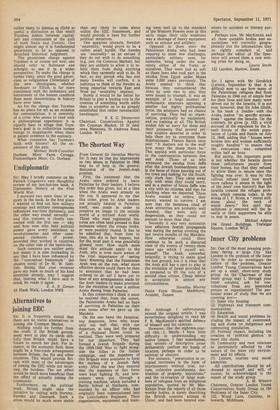The Shortest Way
From General Sir Horatius Murray Sir: It may be that my impressions an two issues in Palestine in 1948 may be of help in the general discussion of the Jewish-Arab problem.
First, the statement that the Arabs were ordered to leave Palestine by their leaders. I believe this order was given, but at a time when the Arabs were already on the run. It appeared to me that this order, given by Arab leaders not actually located in Palestine itself, was . made in order to preserve an image to the outside world of a militant Arab world. Those who read regimental histories are often hard pressed to find instances where the troops broke, or were possibly routed. It has to be admitted that, from time to time, this did in fact happen, but for the most part it was gracefully glossed over. How much more must this attitude apply to the Arab, who is even more aware of the vital importance of saving face.' Knowing that the Palestinian Arab was on the run, what more effective device could there be than to announce that he had been ordered to do so? I have yet to hear of any arrangements made by the Arab leaders to make provision for the reception of over a million Arabs fleeing from Palestine.
In this connection I think it must be realized that, from the outset, the Palestinian Arabs had no hope of surviving in Palestine on their own terms after we gave up the Mandate.
On the one hand the fanatical, nay desperate, Jews who knew only too well that, with our departure, at long last the dream of a National Home could be realized. They were well prepared for our departure. 'they had formed a Jewish Brigade during the 1939-1945 War to fight alongside the Allies in the Italian campaign, and the members of this Brigade were available to form the nucleus of a Jewish field army. After the war they ensured that the members of this force were kept fighting fit, and newcomers were put through a training machine, which included a Battle School at Nathania, commanded by an officer who had originally been commissioned into the Lincolnshire Regiment. Their organisation, equipment and train
ing were well up to the standard of the Western Powers even at this early stage; their only weakness was a shortage of heavy equipment such as armour and artillery.
Opposed to them were the Palestinian Arabs who had been required to meet few challenges, particularly military ones, for centuries, being under the suzerainty either of the Turks or ourselves. They were just as soft as those Jews who took part in the exodus from Egypt under Moses some 3,000 years previously. The Arabs seemed to think that because they outnumbered the Jews by over two to one, they were bound to triumph. It was an example of a large number of enthusiastic amateurs opposing a smaller but highly professional force; the amateurs had no chance of surviving. They had no organization, practically no equipment, and no training at all. The British soldier felt so sorry for them and theif prospects that several private soldiers deserted in order to help them try to overcome these disadvantages. Francis Bacon once said: "It matters not to the wolf how many the sheep there be." This applied with particular force to the confrontation between Jew and Arab. Those of us who witnessed the exodus from Jaffa after the Jewish bombardment saw in the faces of those pouring out of the town and making for the South, only stark fear. They came away only with what they could carry, and in a matter of hours Jaffa was a city with no citizens, and ripe for plucking when we departed. These Arabs needed no orders; they merely wanted to survive. I am sure that the instances cited of Arab attrocities are probably well founded; they were acts of desperation, as they could not amount to more than that.
Secondly it was very noticeable how effective Jewish propaganda was during the period covering the last twelve months of the Mandate. How otherwise could there continue to be such a distorted view of the events of twenty-three years ago which I myself witnessed? The Arab, somewhat belatedly, is trying to make good the lost ground, but it is clear that the Arab still has a part to play in the evolution of Israel provided he is prepared to fill the role of a second class citizen. Cheap labour is acceptable in almost any circumstances.
Horatius Murray Home Farm House, Madehurst, Arundel, Sussex










































 Previous page
Previous page